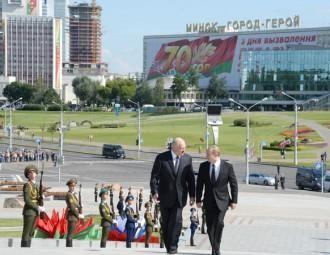Valery Karbalevich: Putin visited Minsk to demonstrate that Russia is fighting against fascism

Negotiations between Putin and Lukashenka completed Russia President’s symbolic visit to Minsk, but didn’t have any significance.
On June 2 Vladimir Putin rushed to Minsk, spending in Belarus less than a day. Participation in the activities to mark Independence Day and the 70th anniversary of Belarus' liberation from the Nazi invaders served as the official excuse for the visit.
However, Vladimir Putin missed the Independence Day itself, which is celebrated on July 3. And the two presidents haven’t yet said a word about their negotiations.
Valery Karbalevich, political scientist, explained EuroBelarus Information Service why the events of the World War II are so important for Putin.
- What was the reason for a five-hour visit of Putin to Minsk? The official explanation differs from the reality: Putin left Minsk as early as July 2.
- I think on the contrary: the official version fully corresponds to the reality. Because of Ukrainian events Great Patriotic War for Russia today is not a mere historical fact, but an ideological basis that can explain Russian current policy.
Official Russian propaganda assumes that Bandera followers, or fascists, came to power in Ukraine. And Russia is pursuing its important mission – a mission of war against fascism, which was started and fulfilled during the World War II.
This point is of great importance for Putin. I see no other reasons for the visit except for the official version.
- Two parties give no comments about the results of the meeting. Does it mean that they have nothing to say or it means that they didn’t reach the consensus?
- The negotiations mainly served as a supplement to Putin’s visit, which hardly had any significance. I don’t think that the presidents have some fundamental disagreements that had to be resolved right away.
For the official Minsk it was important to get a loan; but VTB Bank has already transferred 2 billion dollars on June 26; the main thing for Minsk now is to wait until intergovernmental loan is transferred, which won’t happen until Russian state budget is adopted. So, certain bureaucracy is taking place.
- Experts keep saying that Putin came to seek greater liability from Lukashenka regarding Ukrainian issue.
- The presidents might have discussed this question. Russia wants Belarus to take consistent pro-Russian stance on Ukraine. Of course, Moscow is dissatisfied with Belarus’ decision to abandon the plan to introduce import tax on Ukrainian goods within the Customs Union.
But I don’t think that this question is so acute to make a conflict out of it, not to say to make it public.
-
03.01
-
07.10
-
22.09
-
17.08
-
12.08
-
30.09








































